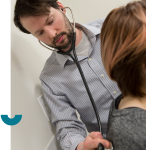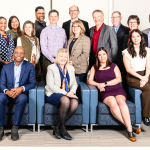Share
Do you support physicians’ freedom of conscience?
"Yes I support this, as long as the decisions taken can be justified and do not result in poorer outcomes (as measured by accepted metrics and indicators) the patient and the population as a whole."
- Natalie Yanchar
"As stated in my profile (and perhaps due to growing up under a communist regime), I consider autonomy, and by extension freedom of conscience, to be of paramount importance. That includes the freedom of conscience of physicians, other health practitioners, patients, and all fellow human beings, equally. However, freedom does not exist in a vacuum and, as we are being constantly reminded during the COVID pandemic, one person’s freedom can easily turn into another person’s oppression. It is up to the organizations such as CPSA to not consider freedom as a finite resource that needs to be apportioned, but rather as a right that needs to be maximized for all - through thoughtful and fair policy. It is my hope that as a CPSA Councillor I would become involved in such deliberations and decisions."
- Mike Kalisiak
Do you support mandatory vaccination – for the public and for the profession?
"I will answer this question in two parts: 1) I strongly support mandatory Covid-19 vaccination for healthcare professionals during this time of the pandemic as it ensures Personal safety and Protection of the Public.(Professional Requirement). 2) Covid-19 vaccination in a Pandemic for the Public- Alberta Vaccine records was a great step in getting a large numbers of new people to get vaccinated. Autonomy and Informed Consent is the right of the patient and we will need legislation if it needs to be made mandatory."
- Shibu Chacko
"During the meeting, we were each given 30 seconds to declare if we felt vaccines should be mandatory. I’d like to retract my succinct “yes” that I declared (on Sept. 22) as this is a question that I feel has too many nuances to answer in 30 seconds. Autonomy should always be optional. However, ensuring our patients and populations can be kept healthy and safe is not optional. As such, wrt vaccines, individuals must be informed of the risk to the population of non-vaccination and those who work with the public, and especially vulnerable populations, should be vaccinated. If they are not going to be in situations where they can put others at risk and/or increase the risk of viral spread in the population (e.g. public spaces or working with the public and/or vulnerable populations), then they may choose to not be vaccinated."
- Natalie Yanchar
Are informed consent and autonomy absolute non-negotiable rights OR are they optional, dependent on the current situation? (related to mandatory vaccinations)
"Informed consent is an absolute right and this is non-negotiable. Autonomy can be assisted as required. Other aspects to consider are competency when dealing with consent."
- Lee Spencer
Please provide an e.g. of being an ally – aware of your power & privilege and sharing advantages with others
"Being an ally begins with self-reflection and education and I am thankful to many individuals and organizations, especially the AMA and the Rotman School of Management, who provided me with specific opportunities in that regard. Being an EFFECTIVE ALLY, however, requires going beyond owning one’s privilege. As I learned while participating in a selection process, it necessitates learning the actual TOOLS which allow us to notice and counter personal and systemic biases. Using tools such as recognizing and surfacing potential biases early in the process, speaking up, altering the process to include a diverse group of candidates and a wider representation during the selection process, increasing transparency, and collaborating with others concerned with the situation, we were able to create a more fair process, which led to a tangible result of a minority applicant advancing to the next level in their career. My personal lesson here is that, in addition to awareness and acknowledgment, leaders need to continue learning the necessary tools of being effective allies."
- Mike Kalisiak
























Comments for this post are now closed. If you would like to share your feedback on this topic, please email support@cpsa.ca.